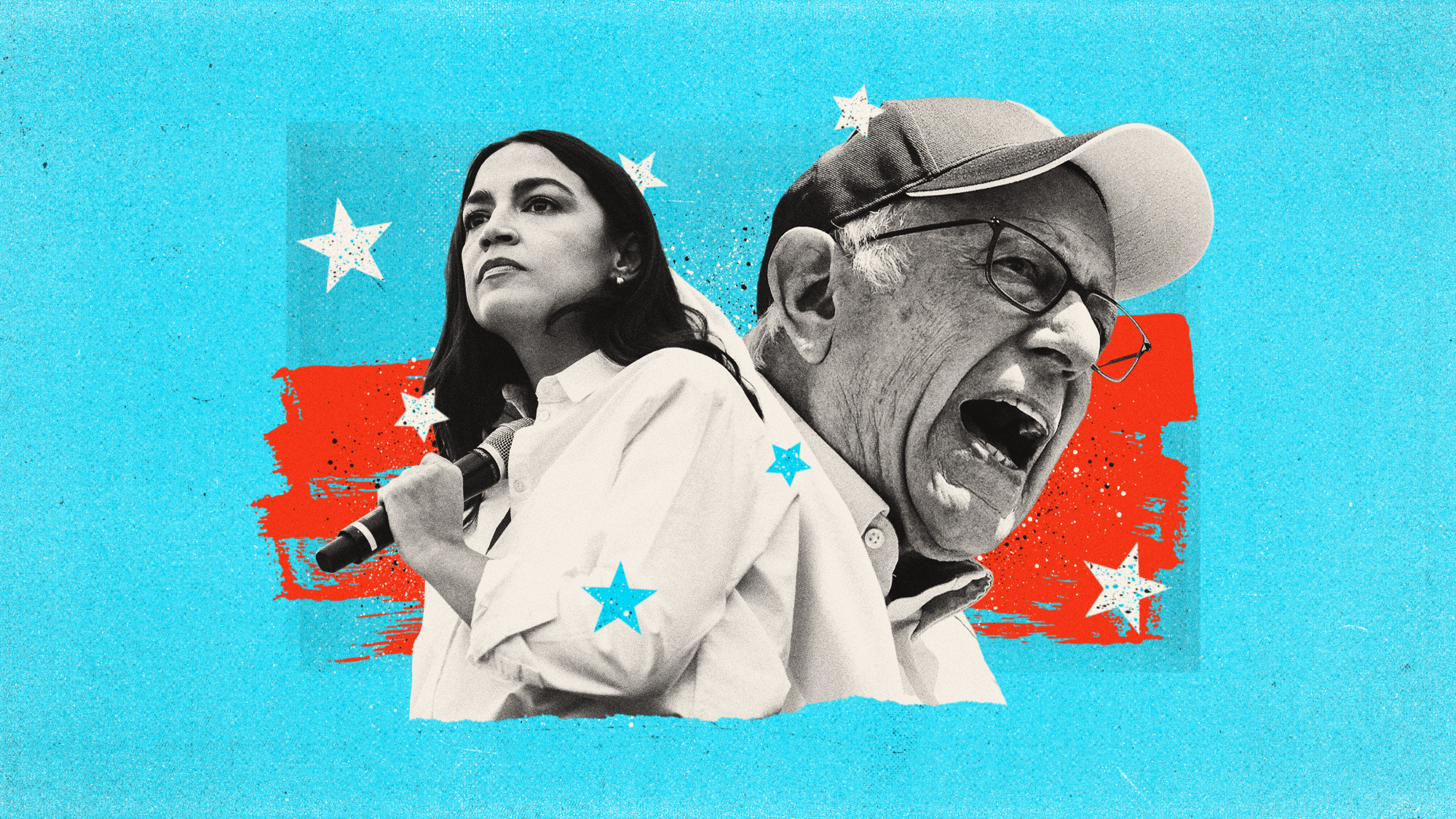It's over for Bernie Sanders
In nearly every contest, Sanders is doing substantially worse than he did four years ago, when he nonetheless lost the race


A free daily email with the biggest news stories of the day – and the best features from TheWeek.com
You are now subscribed
Your newsletter sign-up was successful
Whether or not Vermont Sen. Bernie Sanders suspends his campaign for president in the coming days, he is not going to be the Democratic nominee for president in 2020.
That began to become clear two weeks ago, on the night of Super Tuesday, when Sanders was bested by former Vice President Joe Biden in Virginia, Minnesota, Texas, and several other delegate-rich states. It became even more likely a week later, when Sanders lost Michigan and Missouri by sizable margins. But it turned into a near certainty on Tuesday night with Sanders' nearly 40-point loss to Biden in Florida and his less humiliating but still substantial 23- and 13-point defeats in Illinois and Arizona, respectively.
Sanders' most fervent followers won't want to accept it. They'll say that the race is far from over. That plenty more states still need to vote. That even after Tuesday night's delegates are allocated, Biden will be hundreds away from clinching the nomination. That Sanders will only be a couple hundred or so behind.
The Week
Escape your echo chamber. Get the facts behind the news, plus analysis from multiple perspectives.

Sign up for The Week's Free Newsletters
From our morning news briefing to a weekly Good News Newsletter, get the best of The Week delivered directly to your inbox.
From our morning news briefing to a weekly Good News Newsletter, get the best of The Week delivered directly to your inbox.
All of that will be true, but none of it will matter. That's because Bernie failed to win the nomination in 2016 while running a far more electorally formidable campaign than he has this time around. When we compare his performance in these two cycles, we see a straightforward story of electoral decline and diminishing political momentum.
In 2016, Sanders prevailed in 23 contests in the primary season, winning a total of 43 percent of the vote. This time around, with more than half the states having voted, he's won eight. As for cumulative vote total, Sanders is currently at just under 31 percent — 12 points behind his tally four years ago.
In state after state, Sanders has underperformed in comparison with 2016. Four years ago, he won New Hampshire with 60.1 percent of the vote; this year he won it in a far more crowded field with just 25.6 percent. He won his home state of Vermont in 2016 with 85.7; this time he prevailed with 50.8. In 2016, he narrowly beat Hillary Clinton in Michigan with 49.7; this time he lost it to Joe Biden with 36.4. Last time he nearly won Missouri with 49.4 percent; this year he came up short with just 34.6. In 2016, Sanders lost Florida with 33.3 percent of the vote; Tuesday night he came in around 10 points behind that, with a little under 23 percent. In 2016, Sanders gave Clinton a run for her money in Illinois, coming in with 48.6 percent of the vote; this time he finished 11 points behind at roughly 36 percent.
In nearly every contest, Sanders is doing substantially worse than he did four years ago — when he nonetheless lost the race for the nomination.
A free daily email with the biggest news stories of the day – and the best features from TheWeek.com
The question is what accounts for the decline. Why is Sanders falling so much shorter this time around?
It may well be that the most significant factor in the answer is Hillary Clinton. Clinton was by no means universally loathed by Democratic voters, but she may have been strongly enough disliked by certain (working-class white) voters that they cast ballots for Sanders in the primaries as a kind of protest against the party's presumptive nominee. That could easily have been enough to raise Sanders' vote tally by 10 or so percentage points in comparison to this year, when his main competition (Biden) is much less widely disliked among the same demographic group that was repelled by Clinton.
Then there's the electability argument and the likelihood that significant numbers of primary voters this time around simply can't imagine that an outspoken socialist proposing tens of trillions of dollars of new spending will be capable of beating President Trump in November.
Finally, there's the gathering storm of the global pandemic that has turned American life upside down and inside out over the past two weeks. Any lingering chance of Sanders turning things around after Super Tuesday were almost certainly lost as epidemiological and economic fears have spread throughout the country, arousing a longing for the return of basic competence and a steady hand at the helm — a longing that a mainstream, veteran pol like Biden is perfectly situated to fulfill. Sanders and his most passionate supporters may be ready to fold the astonishing events of recent days into their narrative of a political, economic, and health-care system in need of revolution, but most Democrats (like most Americans) are not.
Sanders is and has always been a factional candidate of the left who isn't really a Democrat at all. That he performed as well as he did in the Democratic primaries two cycles in a row is a tribute to his skills as a politician and the appeal of his message to a certain segment of (overwhelmingly younger) voters. It was just possible to imagine that in a deeply divided field he might have reproduced Trump's hostile takeover of the Republican Party four years ago. But that would have required the near-perfect alignment of competing variables. For a brief period after the New Hampshire primary, and especially following the Nevada caucuses, it seemed like Sanders just might pull it off.
But that fleeting moment is now long gone. Things have returned to something close to political normal at a moment that is anything but. A life-long Democrat who's served as a senator for 35 years and vice president for eight is going to be the party's nominee. And the socialist insurgent is going to lose — regardless of whether he does the sensible thing and quickly bows out in response to reality.
Want more essential commentary and analysis like this delivered straight to your inbox? Sign up for The Week's "Today's best articles" newsletter here.
Damon Linker is a senior correspondent at TheWeek.com. He is also a former contributing editor at The New Republic and the author of The Theocons and The Religious Test.
-
 Why is the Trump administration talking about ‘Western civilization’?
Why is the Trump administration talking about ‘Western civilization’?Talking Points Rubio says Europe, US bonded by religion and ancestry
-
 Quentin Deranque: a student’s death energizes the French far right
Quentin Deranque: a student’s death energizes the French far rightIN THE SPOTLIGHT Reactions to the violent killing of an ultraconservative activist offer a glimpse at the culture wars roiling France ahead of next year’s elections
-
 Secured vs. unsecured loans: how do they differ and which is better?
Secured vs. unsecured loans: how do they differ and which is better?the explainer They are distinguished by the level of risk and the inclusion of collateral
-
 The billionaires’ wealth tax: a catastrophe for California?
The billionaires’ wealth tax: a catastrophe for California?Talking Point Peter Thiel and Larry Page preparing to change state residency
-
 Mamdani vows big changes as New York’s new mayor
Mamdani vows big changes as New York’s new mayorSpeed Read
-
 Bari Weiss’ ‘60 Minutes’ scandal is about more than one report
Bari Weiss’ ‘60 Minutes’ scandal is about more than one reportIN THE SPOTLIGHT By blocking an approved segment on a controversial prison holding US deportees in El Salvador, the editor-in-chief of CBS News has become the main story
-
 Has Zohran Mamdani shown the Democrats how to win again?
Has Zohran Mamdani shown the Democrats how to win again?Today’s Big Question New York City mayoral election touted as victory for left-wing populists but moderate centrist wins elsewhere present more complex path for Democratic Party
-
 Millions turn out for anti-Trump ‘No Kings’ rallies
Millions turn out for anti-Trump ‘No Kings’ ralliesSpeed Read An estimated 7 million people participated, 2 million more than at the first ‘No Kings’ protest in June
-
 Ghislaine Maxwell: angling for a Trump pardon
Ghislaine Maxwell: angling for a Trump pardonTalking Point Convicted sex trafficker's testimony could shed new light on president's links to Jeffrey Epstein
-
 The last words and final moments of 40 presidents
The last words and final moments of 40 presidentsThe Explainer Some are eloquent quotes worthy of the holders of the highest office in the nation, and others... aren't
-
 The anger fueling the Bernie Sanders and Alexandria Ocasio-Cortez barnstorming tour
The anger fueling the Bernie Sanders and Alexandria Ocasio-Cortez barnstorming tourTalking Points The duo is drawing big anti-Trump crowds in red states
